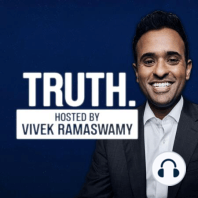63 min listen

Newt Gingrich on The Influence of the Past: Lessons from the 1994 Republican Revolution
Newt Gingrich on The Influence of the Past: Lessons from the 1994 Republican Revolution
ratings:
Length:
32 minutes
Released:
Jun 26, 2023
Format:
Podcast episode
Description
In this episode of The Vivek Show, host Vivek Ramaswamy speaks with former Speaker of the House, Newt Gingrich, about the 1994 Republican Revolution and its implications for today's political landscape. They discuss the lessons of the 1994 Revolution, its relevance to the current political environment, and the stark contrast between the political positions of Bill Clinton and Joe Biden. Gingrich discusses how the left has been systematically chipping away at welfare reform over the years, drawing parallels between current state of affairs and George Orwell's 1984. He highlights his time in Congress which led to four consecutive balanced budgets and welfare reform, emphasizing the need for another national movement.Gingrich acknowledges Vivek's role in shaping a new vision for America and emphasizes that the solutions to today's challenges lie in the principles of past leaders, including Reagan and the Founding Fathers. They discuss the left's movement towards a dictatorship of ideas, and Gingrich's stepping down as Speaker of the House. Gingrich also reveals his impact on the balance of power in Washington after leaving office, and why he chose not to run for president in 2000. The conversation concludes with a discussion on the importance of visionary leaders during moments of national identity crisis, and the need for leaders who can both articulate and execute big ideas during challenging times.--Donate here: https://t.co/PE1rfuVBmbFor more content follow me here:Twitter - @VivekGRamaswamyInstagram - @vivekgramaswamyFacebook - http://facebook.com/VivekGRamaswamyTruth Social - @VivekRamaswamyRumble - @VivekRamaswamy--Time-Codes:00:00:00: Introduction of the topic of the 1994 Republican Revolution and its current relevance.00:02:16: Lessons from the 1994 Republican Revolution applied to today's political climate.00:08:00: Discussion on the left's efforts to chip away at welfare reform.00:10:29: Comparison of the current state of the US to George Orwell's 1984.00:12:49: Discussion on changes leading to balanced budgets and welfare reform during Gingrich's time in Congress.00:15:30: Acknowledgement of Vivek's role in shaping a new vision for America.00:17:30: Discussion on the continuity of ideas from Reagan to the Founding Fathers.00:19:00: Expression of concern about the left's movement towards a dictatorship of ideas.00:23:26: Explanation of why Gingrich did not consider running for president in 2000.00:29:18: Importance of visionary leaders during moments of national identity crisis.
Released:
Jun 26, 2023
Format:
Podcast episode
Titles in the series (65)
The Hidden Truth Behind Affirmative Action: A Revealing Discussion with Richard Hanania: In this eye-opening episode of "The Vivek Show," host Vivek Ramaswamy is joined by political scientist and writer Richard Hanania. They delve deep into the origins, history, and consequences of affirmative action in America. By examining the political motivations behind these policies, Richard and Vivek discuss how affirmative action has shaped institutions, influenced the education system, and affected the current cultural climate. Through their thought-provoking conversation, they explore the challenges in addressing affirmative action and its impact on meritocracy, race, and society. by Truth with Vivek Ramaswamy